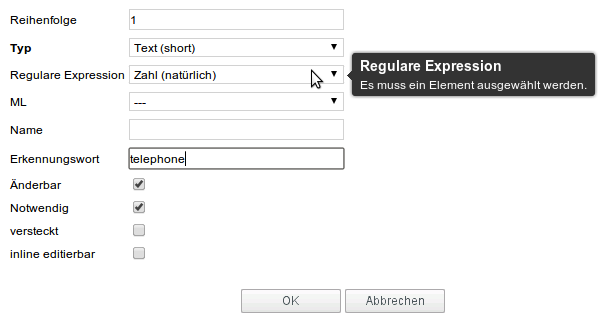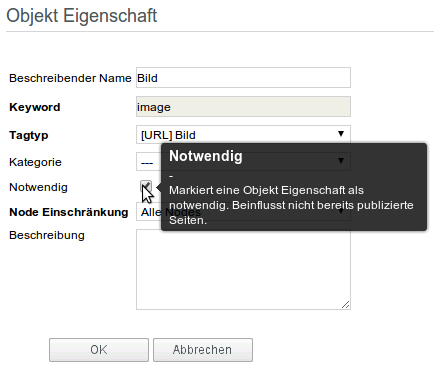1 When would I want to use mandatory tags?
When ContentTags are automatically created for a page that is opened for editing, these tags will contain default values, but these values may not be suitable to be published. The rational behind having mandatory Tags is to allow implementers to ensure that an editor must explicitly populate any such tags so that their default values will be replaced with appropriate values before a page can be published.
TemplateTags and ObjectTags are the only tags that can be flagged as “mandatory” or “required” because it is from these that ContentTags are automatically generated from them (as needed) when a page is opened for editing.
2 How do I configure mandatory tags?
You will need a TagType that contains one or more tag part type that is both “required” and “editable”. You can then choose from among the configured regular expressions, as the constraint against which the value of this part type will be validated.

Including a tag of your TagType in a template then allows you to define whether or not the the values for the part types of this tag must meet the requirements specified by the TagType’s parts before the page can be saved.
Only tags that are editable on the page object can be set to be mandatory. If it were possible to mark a readonly tag as mandatory, it would effectively prevent the page from being published (a catch-22)!

You can also define a mandatory tag by simply setting any page object tag as “required”. 
3 What happens when I publish a page with mandatory tags?
When an attempt is made to publish a page, that page will be checked to see if it contains any ContentTags that were generated from TemplateTags or ObjectTags. Any of these ContentTags will be checked to see if they have been marked as mandatory or required. Any such tag that is found will have it parts validated according to any constraints determined by the Tag Construct from which they are based.
If all parts of all mandatory tags pass validation, the page is published. If any of the parts contains invalid or missing data, the publish attempt will fail with a INVALIDDATA error:
The presence of incomplete mandatory tags does not affect saving; it is entirely valid to save an unfinished page that contains incomplete mandatory tags.
4 How do mandatory tag affect import/export?
Mandatory tags are imported and exported just like other content node objects. Take note that any published pages that are imported, will remain as they are in their publish state. None of the mandatory tag configuration in the system in which the pages are placed will affect the page until an attempt is made to republish the page in the Node into which it are imported.
5 Does changing mandatory tag settings affect already published pages?
Pages that have been published will remain as they are — even if one of their tags is changed to be mandatory. However, if a published page has one of its tags changed to be mandatory, that page will no longer be able to be published until the tag has had its tag parts populated with any required values, or until the tag is set back to be non-mandatory.